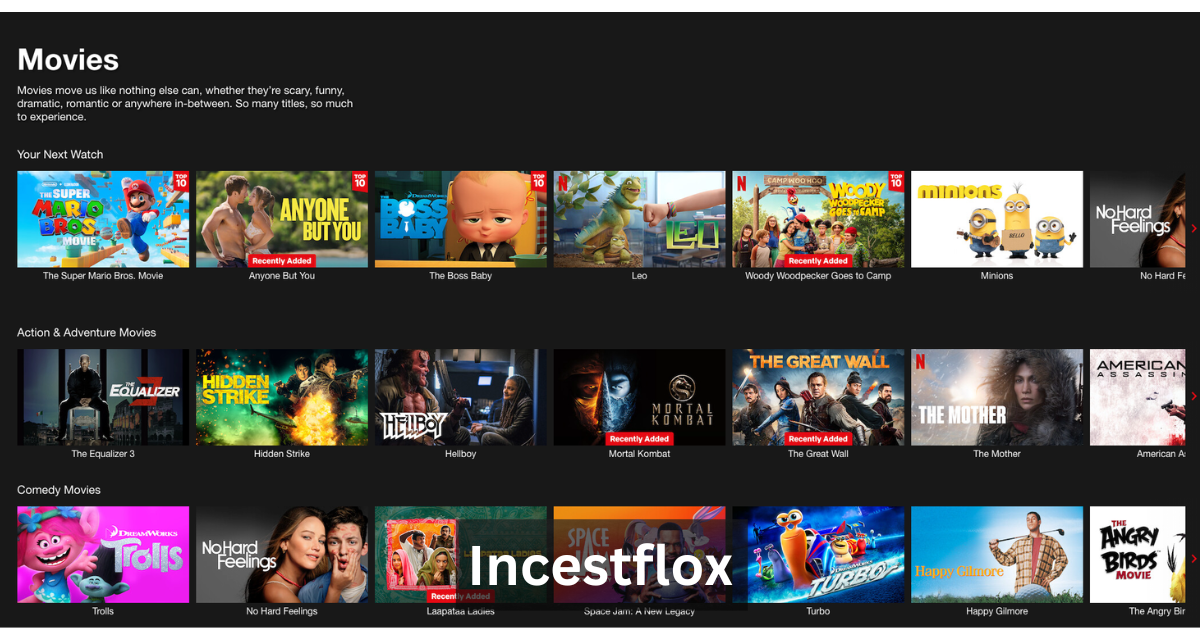IIncestflox is a term used to describe online harassment where false and malicious accusations, often involving incest or similar serious claims, are spread about someone. These accusations typically aim to damage the individual’s reputation and cause emotional distress. These accusations are often designed to ruin reputations, spread emotional distress, and wreak havoc on the lives of the victims.
This article aims to unpack the concept of incestflox, understand its psychological and legal impacts, and discuss measures to protect yourself from such forms of online harassment. We will explore its origins, how it spreads through social media, and how individuals and organizations can prevent such harmful activities. It is essential to understand how these online threats impact mental health, the consequences for the individuals involved, and the societal role of online platforms.
Incestflox is a term that refers to a specific form of cyberbullying and online harassment that involves spreading false or malicious accusations, often on social media platforms like Twitter, Reddit, and Facebook. These accusations may include allegations of incest, abuse, or other inappropriate behavior that severely tarnish an individual’s reputation, regardless of their truth.
While the exact origins of the term “incestflox” are still debated, it primarily refers to cases where social media mobs target individuals with baseless claims, causing significant damage to their personal, professional, and mental well-being. The psychological toll of social media harassment can be overwhelming, with victims facing emotional distress, anxiety, depression, and even suicidal thoughts.
The rise of social media has brought numerous benefits, such as fostering connections and providing a platform for voices that were previously unheard. However, it has also become a breeding ground for cyberbullying, public shaming, and social media harassment. Incestflox falls into this category, and addressing it is crucial to protecting individuals’ well-being.
There is an urgent need for digital privacy laws and more effective regulations around online harassment to ensure victims are shielded from false allegations and that the platforms themselves are held accountable. Understanding the causes and effects of harassment will help in developing better responses to online threats and in creating safer digital spaces.
Understanding the Term ‘Incestflox’
To understand incestflox, we need to look at how it functions within the larger context of online harassment and cancel culture. This term is a combination of two elements: incest, a deeply taboo subject, and flox, a term used to describe the act of mass shaming or targeting individuals on the internet. In the case of incestflox, the accused is usually subjected to an intense, public social media campaign, resulting in extreme social stigmatization.
Origins and Context of Incestflox
The concept of incestflox likely began to emerge as social media platforms grew and became hubs for outrage culture. It stems from the mob mentality that takes over online communities where individuals or groups call out perceived wrongdoings, even if those accusations are entirely fabricated. With social media platforms like Twitter and Reddit amplifying messages across vast networks, the impact of false accusations has grown exponentially, leading to significant emotional and psychological damage for those wrongly accused.
Key Features of Incestflox Harassment
Incestflox is distinct from other types of cyberbullying or defamation in several ways. First, the allegations involved are typically highly sensitive, dealing with personal and private matters that are often fabricated to exploit taboos. Second, the sheer scale of online reputation damage caused by these false claims can be massive, as they spread rapidly across social media, attracting the attention of thousands, if not millions, of people.
Additionally, the mental health effects of public shaming are often devastating for the victims of incestflox. Many people who experience this type of harassment report feelings of helplessness, anxiety, and depression. The emotional distress from harassment can be long-lasting, and some victims may find it difficult to recover from the damage done to their reputation and personal relationships.
The Role of Social Media in Incestflox
Social media plays a central role in the spread of incestflox. Platforms like Facebook, Instagram, Twitter, and Reddit provide a space for users to share their thoughts and opinions, but they can also be exploited by malicious individuals or groups to target others with harmful accusations. These platforms allow false allegations to spread rapidly, often without any verification of the claims being made.
How Platforms Contribute to the Spread of Harassment
Unfortunately, social media platforms have not always been quick to implement measures to protect users from social media harassment. Many platforms lack adequate moderation tools, and false accusations can sometimes go viral before they are taken down. This is a significant issue, as victims of incestflox often find themselves helpless in the face of an online mob that refuses to stop or retract their allegations.
Case Studies of Incestflox on Popular Platforms
Incestflox cases have been observed in various online spaces. For example, Twitter has seen instances where public figures were targeted with false allegations, leading to a wave of online hate and public shaming. Reddit threads have been used to perpetuate doxxing (revealing private information about someone without their consent), further escalating the harassment.
One high-profile case involved a public figure who was falsely accused of incest, leading to a massive backlash on social media. The case garnered millions of views and comments, some of which led to harassment in real life. The psychological toll on the victim was immense, with long-term effects on both their personal and professional lives.
Psychological Impact of Incestflox on Victims
The psychological effects of being targeted by incestflox can be profound. Victims often experience a range of emotions, from shame and guilt to anxiety and depression. They may feel isolated from their friends, family, and online communities, as the accusations often result in ostracization.
Emotional and Mental Health Consequences
Victims of incestflox may experience mental health issues such as anxiety, depression, and post-traumatic stress disorder (PTSD). The psychological toll of social media harassment can make it difficult for the individual to move forward, and in many cases, the emotional distress can last long after the accusations have been debunked.
Long-Term Effects on the Victim’s Life and Family
The consequences of being accused in a case of incestflox are not just limited to the victim. Family dynamics after public accusations often shift as relatives and friends are forced to confront the harsh public reaction to the claims. In some cases, the emotional damage to families can be irreversible, affecting relationships and creating long-lasting tensions.
The Legal Implications of Incestflox
The legal ramifications of incestflox are significant. While the defamation laws in many countries allow victims to seek redress for false accusations, the process of legal action can be lengthy and difficult. In cases of doxxing, where private information is exposed, victims may also be able to pursue legal action under digital privacy laws such as the GDPR (General Data Protection Regulation) in Europe or the CCPA (California Consumer Privacy Act) in the United States.
Defamation Laws and Legal Recourse for Victims
Victims of online defamation may have the right to take legal action against those responsible for spreading false accusations. Legal recourse for online harassment typically involves filing a defamation lawsuit or taking advantage of laws related to privacy protection online.
Anti-Doxxing Legislation and Digital Privacy Protection
As incidents of doxxing and online harassment continue to rise, many governments are strengthening anti-doxxing laws and implementing stronger measures for digital privacy protection. These laws aim to prevent the public exposure of personal information and to protect individuals from being targeted by malicious online campaigns.
Protecting Yourself from Incestflox
In an increasingly digital world, protecting oneself from the risks of online harassment and privacy invasion has never been more important. Here are some key steps you can take to reduce the chances of becoming a target of incestflox:
Online Privacy Protection Tips: VPNs, Encryption, and Security Tools
Using cybersecurity tools like VPNs (Virtual Private Networks) and encryption can help protect your identity and prevent hackers or malicious users from accessing your personal information. These tools offer an extra layer of security when browsing the internet and can help protect you from online threats.
How to Prevent Doxxing and Public Exposure
To avoid the risks of doxxing, it is important to safeguard your personal information. Use strong, unique passwords, be cautious about sharing personal details online, and make use of anti-doxxing technologies that help obscure your identity. Always be vigilant about what you share on social media, as even innocent details can be used to harm you.
The Role of Cancel Culture in Incestflox
Cancel culture plays a significant role in amplifying the harm caused by incestflox. When individuals are accused of serious offenses, they are often subjected to a public shaming that can quickly spiral out of control, leading to further harassment and online abuse.
How Cancel Culture Amplifies Harassment
Cancel culture thrives on social media, where individuals or groups of people decide to “cancel” someone based on perceived wrongdoings, often without any concrete evidence. This can lead to false allegations being taken as fact, further exacerbating the emotional and psychological damage experienced by victims.
The Ethical Dilemmas and Consequences of Public Shaming
The ethical implications of online shaming and public accusations are complex. While cancel culture seeks to hold individuals accountable for their actions, it often comes at the expense of fair judgment and due process. This can result in reputation damage due to false accusations and long-term psychological effects on the accused.
Combating Incestflox: What Can Be Done?
Combating incestflox requires a multifaceted approach, involving individuals, online communities, legal authorities, and social media platforms. By working together, we can create a safer online environment and ensure that cancel culture does not lead to harmful consequences.
Preventative Measures for Individuals and Organizations
Individuals should take steps to protect their privacy online, be cautious with what they share, and educate themselves about cyberbullying prevention organizations and anti-doxxing tools. Organizations should implement stricter social media policies and provide support for victims of online harassment.
Role of Social Media Platforms in Combating Online Harassment
Social media platforms must take responsibility for their role in spreading false accusations and harassment. They should invest in cybersecurity measures against harassment, improve moderation tools, and actively take down harmful content. Only by holding these platforms accountable can we start to reduce the prevalence of social media harassment.
Conclusion
Incestflox is a dangerous form of online harassment that can have long-lasting effects on the victim’s mental health, relationships, and reputation. By understanding its impact and taking proactive measures to protect oneself, we can fight back against the rise of online abuse. As digital privacy laws continue to evolve, it is crucial to stay informed and take control of our online reputation.
Frequently Asked Questions
How does Incestflox impact victims?
The psychological impact of incestflox can be severe, leading to anxiety, depression, and long-term emotional distress. Victims often face public shaming and social ostracism, affecting their personal and professional lives.
What are the legal consequences of Incestflox?
Incestflox can lead to legal repercussions under defamation laws, as false accusations harm an individual’s reputation. Victims can seek legal action for defamation, harassment, and invasion of privacy, depending on the severity of the case.
How can I protect myself from Incestflox?
To protect yourself from incestflox, maintain strong online privacy by using VPNs, encryption tools, and being cautious with personal information on social media. Regularly monitor your online presence to ensure your data is secure.
What role do social media platforms play in Incestflox?
Social media platforms can amplify the spread of incestflox due to their large reach and lack of effective moderation. It’s important for these platforms to implement stronger measures to prevent harassment and protect users from false accusations.
Stay in touch to get more updates & alerts on WashingtonGreek! Thank you



